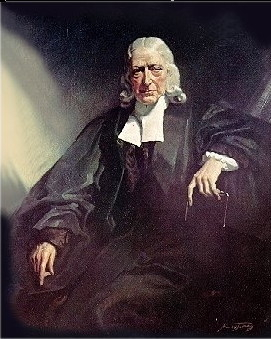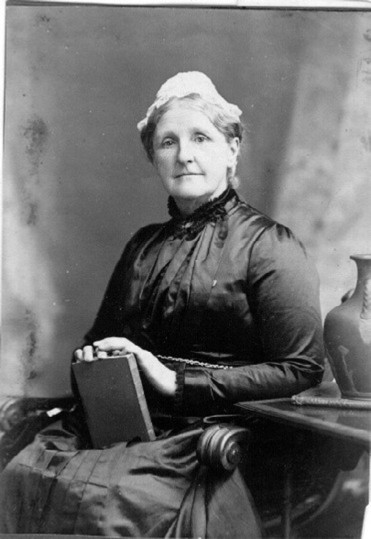Sanctification and Fanaticism
Long ago I posted this quote on the Hidden Life blog:
In proportion as the heart becomes sanctified, there is a diminished tendency to enthusiasm and fanaticism. And this is undoubtedly one of the leading tests of sanctification. One of the marks of an enthusiastic and fanatical state of mind, is a fiery and unrestrained impetuosity of feeling; a rushing on, sometimes very blindly, as if the world were in danger, or as if the great Creator were not at the helm. It is not only feeling without a due degree of judgment, but, what is the corrupting and fatal trait, it is feeling without a due degree of confidence in God. True holiness reflects the image of God in this respect as well as in others, that it is calm, thoughtful, deliberate, immutable. And how can it be otherwise, since, rejecting its own wisdom and strength, it incorporates into itself the wisdom and strength of the Almighty.
— Religious Maxims (1846) XII.
And I still like this quote, in part, because it seems at first so counter-intuitive. Isn’t fanaticism too much religion? Here Upham says just the opposite: it is the result of having not enough religion: or, more properly, not having enough sanctification. (more…)
A Conversation: Wesleyan Holiness Heritage
Here is a link to the book I referenced in the video at 15:49 – Holy Trinity: Holy People (Didsbury Lectures) by T. A. Noble https://www.amazon.com/dp/1620327201
Here is a link to Stephen Manskar’s A Perfect Love: Understanding John Wesley’s A Plain Account of Christian Perfection: https://www.amazon.com/Perfect-Love-Understanding-Christian-Perfection/dp/088177426X/
SOME LINKS TO INFORMATION HERE & MY RELATED SITES:
(more…)Eternal Security? Notes on John 10:22-30.
This passage is a continuation of Jesus’ claim to be the Good Shepherd. This passage comments on the material that appears in the first part of this chapter.
This passage is very important for establishing Jesus’ role as Messiah and Son of God. Here we discover something of what is meant by claiming that Jesus fulfills those roles. We also come to some sense of what it means to be part of Jesus’ sheep — his followers.
Macrina on Eliminating Evil
I found this quote in a Facebook group I am a part of, so I cannot personally vouch for it. I trust it is correct. This is Macrina (the Younger) teaching her brother Gregory of Nyssa:

“For evil must be altogether removed in every way from being, and, as we have said before, that which does not really exist must cease to exist at all. Since evil does not exist by its nature outside of free choice, when all choice is in God, evil will suffer a complete annihilation because no receptacle remains for it.”
(Recounted by Gregory in *On the Soul and the Resurrection*.)
(more…)John Wesley: Why Aren’t All People Saved?

“If you ask, ‘Why then are not all men saved’ the whole law and the testimony answer, First, Not because of any decree of God; not because it is his pleasure they should die; for, As I live, saith the Lord God, ‘I have no pleasure in the death of him that dieth.’ (Ezek. 18:3, 32.) Whatever be the cause of their perishing, it cannot be his will, if the oracles of God are true; for they declare, ‘He is not willing that any should perish, but that all should come to repentance;’ (2 Pet. 3:9;) ‘He willeth that all men should be saved.’ And they, Secondly, declare what is the cause why all men are not saved, namely, that they will not be saved: So our Lord expressly, ‘Ye will not come unto me that ye may have life.’ (John 5:40.) ‘The power of the Lord is present to heal’ them, but they will not be healed. ‘They reject the counsel,’ the merciful counsel, ‘of God against themselves,’ as did their stiff-necked forefathers. And therefore are they without excuse; because God would save them, but they will not be saved: This is the condemnation, ‘How often would I have gathered you together, and ye would not!’ (Matt. 23:37.)
(more…)Dods: What is Christianity?
“When they had finished eating, Jesus said to Simon Peter, ‘Simon son of John, do you love me more than these?’ ‘Yes, Lord,’ he said, ‘you know that I love you.’ Jesus said, ‘Feed my lambs.’” — John 21:15 NIV.

“What is Christianity? It is God’s way of getting hold of us, of attaching us to what is good, of making us holy, perfect beings. And the method He uses is the presentation of goodness in a personal form. God makes goodness supremely attractive by exhibiting to us its reality and its beauty and its permanent and multiplying power in Jesus Christ. Absolutely simple and absolutely natural is God’s method. The building up of systems of theology, the elaborate organization of churches, the various expensive and complicated methods of humanity, how artificial do they seem when set alongside of the simplicity and naturalness of God’s method! People are to be made perfect. Show them, then, that human perfection is perfect love for them, and can they fail to love it and themselves become perfect? That is all. The mission of Christ and the salvation of people through Him are as natural and as simple as the mother’s caress of her child. Christ came to earth because He loved people and could not help coming. Being on earth, He expresses what is in Him — His love, His goodness. By His loving all people and satisfying all their needs, people came to feel that this was the Perfect One, and humbly gave themselves to Him. As simply as love works in all human affairs and relationships, so simply does it work here.” — Marcus Dods (1834-1909), The Gospel of John, Volume 2 (The Expositor’s Bible) Chapter 25.
I changed some of the language of this quote to make it conform to contemporary usage and spelling.
The Mother-Heart of God
Jesus said: “Jerusalem, Jerusalem, the city that kills the prophets and stones those who are sent to it! How often have I desired to gather your children together as a hen gathers her brood under her wings, and you were not willing!” — Luke 13:34 NRSV.
From the autobiography of Hannah Whitall Smith (1832–1911) — a 19th century Quaker-turned-Wesleyan-holiness-preacher:

“My children have been the joy of my life. I cannot imagine more exquisite bliss than comes to one sometimes in the possession and companionship of a child. To me there have been moments, when my arms have been around my children, that have seemed more like what the bliss of heaven must be than any other thing I can conceive of; and I think this feeling has taught me more of what are God’s feelings towards his children than anything else in the universe. If I, a human being with limited capacity, can find such joy in my children, what must God, with his infinite heart of love, feel towards his; in fact, most of my ideas of the love and goodness of God have come from my own experience as a mother, because I could not conceive that God would create me with a greater capacity for unselfishness and self-sacrifice than he possessed himself; and since this discovery of the mother heart of God I have always been able to answer every doubt that may have arisen in my mind, as to the extent and quality of the love of God, by simply looking at my own feelings as a mother. I cannot understand the possibility of any selfishness on the mother’s part coming into her relation to her children. It seems to me a mother, who can be selfish and think of her own comfort and her own welfare before that of her children, is an abnormal mother, who fails in the very highest duty of motherhood . . . Since I had this insight of the mother-heart of God, I have never been able to feel the slightest anxiety for any of his children; and by his children I do not mean only the good ones, but I mean the bad ones just as much.”
[Only three of Hannah’s seven children lived to adulthood (one went on to marry the philosopher Bertrand Russell — from whom she was divorced after he had an affair.)]
Coming Home
For a long time, I felt like I was kind of a nomad. I am still reminded of the fact every time someone asks me “Where are you from?” It’s not supposed to be a difficult question.
But, I don’t really know.

I will often reply: “I’m from around.”
At times I have had a real sense of rootlessness. Things are different now, but I haven’t forgotten.
I guess you have to know my life to understand the problem. (more…)
John Wesley & Gerasimos Avlonites: Two Paintings
Many of us who are interested in the theology of John Wesley are also fascinated by the connections that seem to exist between Wesley’s theology and the theology of the Eastern Orthodox church. For example, the Eastern Orthodox teaching of theosis seems to mirror strikingly Wesley’s teaching on Christian Perfection.

Gerasimos Avlonites, portrait by Inès Lee commissioned by John Das
But, then, there is also the fascinating story of John Wesley and Gerasimos Avlonites (also known as Erasmus of Arcadia), an 18th century Greek Orthodox bishop — and friend of Wesley’s. Gerasimos Avlonites originally hailed from Crete. Ted A. Campbell describes him as “a native of Corfu and a subject of the Latin and Catholic Republic of Venice, [he was] exiled from his ecclesiastical see in Ottoman-dominated Crete, [and] brought his own pietistic sense of Christian unity to his interactions with European Protestants who were also evolving a pietistic sense of Christian identity in the mid-eighteenth century.”
Arnold A. Dallimore refers to the relationship of John Wesley and this man when writing on the life of Charles Wesley:
John Wesley showed him kindness but had one of his men write to the Patriarch of Smyrna inquiring about him. He received word that Erasmus was the Bishop of Arcadia on the Isle of Crete. Wesley also heard the same from Amsterdam, and accordingly accepted him as a link in the supposed chain of the apostolic succession.
John Wesley spoke highly of Gerasimos Avlonites saying: “He had abundant unexceptionable credentials as to his episcopal character.” (more…)
Why I Don’t Trust Politics
I consider politics to be a necessary evil.
 Maybe that’s too strong a statement. Someone might reply to me that the Christian message itself has political implications — and they would surely be right. Obviously, the Old Testament prophets — just to cite one obvious example — had a political message about justice and fairness (in addition to a moral message about right and wrong). Jesus’ message of the Kingdom of God finds its roots in the message of the prophets. I’m all in favor of spelling out the political and social aspects of the Christian message. Really. I am.
Maybe that’s too strong a statement. Someone might reply to me that the Christian message itself has political implications — and they would surely be right. Obviously, the Old Testament prophets — just to cite one obvious example — had a political message about justice and fairness (in addition to a moral message about right and wrong). Jesus’ message of the Kingdom of God finds its roots in the message of the prophets. I’m all in favor of spelling out the political and social aspects of the Christian message. Really. I am.
And, politics is unavoidable. Where two or three are gathered together, there — pretty soon — will be politics in their midst. People have differing ideas and goals and agendas. If people gather together to accomplish something, then, soon these differences will arise. Sides will emerge. Issues will emerge. The question will be: who will prevail.
So, while there is national politics, there is also community politics, church politics, and family politics. I know that. And, there is no avoiding it.
But, here’s my problem with it: (more…)
N. T. Wright: Power to Become Children

N. T. Wright
From a sermon by N. T. Wright, preached at Cathedral Church of Durham on Christmas Morning 2007:
Because what we are promised, in that strange phrase at the heart of John’s prologue, is a new kind of power: to all who received him, who believed in his name, he gave power to become children of God. Power to become children! There’s a paradox for you: power to become powerless, authority to be under authority. Ah, people will say, but children of God; yes, but the meaning of the word ‘God’ is now being redefined, in this very paragraph, so that we only really discover who God is when we look at Jesus, Jesus the helpless baby, Jesus the one who reveals God’s glory when he dies on the cross, Jesus the only begotten Son who has revealed the invisible God. And when we hear that gospel word, and discover that something new is happening within us, something is stirring which feels very like faith, and hope, and love, we know that a new kind of life has taken hold on us, meaning that we have indeed been born again, whether a moment before or a lifetime before, have been made new with a life which death cannot touch, a life which will lighten our path through whatever darkness lies ahead, a life which doesn’t spring from mere human possibilities – born, says John, not of blood or of the will of the flesh or of the will of man, but of God. Power to become children: that’s the promise of new birth, full of grace and truth.
“Part of the art of listening to scripture is learning to hear the multiple overtones in a single, simple phrase. And the Word became flesh and lived among us, says John: and we learn, and learn again, every Christmas, to hear in that great and simple statement all the glory of the new world, with its new possibilities: new life in Mary’s womb, new life within the increasingly dangerous public world which does its best to squash the rumour, and new life, please God, in our own hearts and lives and families and work. And the Word became flesh and lived among us. That is what we celebrate today: the new reality which leaves us no longer at ease in the old dispensation, but determined to live and rejoice and be part of his transforming work of new creation, so that though the world declares that it can’t see God and doesn’t know who he is we may declare, in what we are as well as what we say, that God the only Son, the Word made flesh, close to the Father’s heart, has made him known and will make him known. May that be true in us and through us this Christmas time and always.
The rest of the sermon can be found here: Power to Become Children.
Merton on Loving Created Things

Thomas Merton (1915–1968)
A saint is capable of loving created things and enjoying the use of them and dealing with them in a perfectly simple, natural manner, making no formal references to God, drawing no attention to his own piety, and acting without any artificial rigidity at all. His gentleness and his sweetness are not pressed through his pores by the crushing restraint of a spiritual strait-jacket. They come from his direct docility to the light of truth and to the will of God. Hence a saint is capable of talking about the world without any explicit reference to God, in such a way that his statement gives greater glory to God than the observations of someone less holy, who has to strain himself to make an arbitrary connection between creatures and God through the medium of hackneyed analogies and metaphors that are so feeble that they make you think there is something the matter with religion.
— Thomas Merton, New Seeds of Contemplation, p. 24
Found here.
My Call to Biblical Preaching
I am one of those pastors who came into the Christian ministry a clear sense of call. I could point to a particular moment in my life when I sensed God’s calling on my life. It was both surprising and overwhelming at the time. But, over time, it became the settled conviction of my heart that God was calling me to preach the Gospel in some way. And, I need to make that clear: in the earlier stages of my life the call I felt was toward preaching. When I started out I had very little conception of what pastoral ministry was and what it might entail. I had come to Christ at the invitation of an evangelist at a holiness camp meeting. The message of Christ had made a profound change in my life for the better. And, I wanted to share that message with others. I felt that a great favor had been done for me — a message of hope had been given to me — and I wanted to extend that favor to others. My attitude was the same as that expressed in the often quoted line from D. T. Niles: ““Evangelism is just one beggar telling another beggar where to find bread.”
 Biblical preaching had been crucial in re-directing my life. So, it was something I assumed would be the focus of my future ministry — and it was something I wanted to learn to do well.
Biblical preaching had been crucial in re-directing my life. So, it was something I assumed would be the focus of my future ministry — and it was something I wanted to learn to do well.
I sure have met a lot of people over the years for whom evangelical Christianity — and, I might add, holiness Christianity particularly — was an oppressive reality in their lives. It was something imposed upon them. It was a almost-constant threat of Hell. It was legalism. It was a rigid authoritarian mindset from which they later emerged with relief.
I get that. I have heard the story so often — in so many different forms. I understand.
But, that is not my experience. (more…)
God Is a Fool for Love
“Moses said, ‘Show me your glory, I pray.’ And he said, “I will make all my goodness pass before you, and will proclaim before you the name, ‘The LORD’; and I will be gracious to whom I will be gracious, and will show mercy on whom I will show mercy.'” — Exodus 33:18, 19 NRSV.
“At this mo ment, it is not Moses the religious-political leader of Israel speaking, but Moses the mystic, the ardent lover of God. The public need has been met: God has promised twice already to go up with the people into the Promised Land. You would think Moses would be satisfied, but instead he presses for one more thing: a favor for himself alone, a glimpse of God’s exquisite beauty. Of course God is flattered. Who would not be thrilled to know that a lover through many years and many domestic crises still finds one desirable, desirable just for oneself, when the children’s needs have been met and there is nothing to be sought or gained but the simple joy of intimacy? It is only in that request for a private revelation that God feels the purity of Moses’ love. Of course God capitulates, happily, even to the point of indignity. For as the whole Bible makes undeniably clear, God is a perfect fool for love — fool enough even to become human, to live and love as we do, and to weep because he loves; fool enough to suffer and die on a cross.”
ment, it is not Moses the religious-political leader of Israel speaking, but Moses the mystic, the ardent lover of God. The public need has been met: God has promised twice already to go up with the people into the Promised Land. You would think Moses would be satisfied, but instead he presses for one more thing: a favor for himself alone, a glimpse of God’s exquisite beauty. Of course God is flattered. Who would not be thrilled to know that a lover through many years and many domestic crises still finds one desirable, desirable just for oneself, when the children’s needs have been met and there is nothing to be sought or gained but the simple joy of intimacy? It is only in that request for a private revelation that God feels the purity of Moses’ love. Of course God capitulates, happily, even to the point of indignity. For as the whole Bible makes undeniably clear, God is a perfect fool for love — fool enough even to become human, to live and love as we do, and to weep because he loves; fool enough to suffer and die on a cross.”
— Ellen F. Davis, Getting Involved with God: Rediscovering the Old Testament
An Unstable Nation – Amos 7:7-17
 The verses that come before this set the scene. The opening verses of this chapter remind us that Amos was a man of prayer. He was an intercessor. He was not a politician. He was not even what we might call a “social critic.” Nor did he come with some sort of political solution to the problems of Israel. He spoke the word God had given him. His saw the inequities and sins of the northern kingdom (called Israel or Ephraim). But, when he saw the prospect of destruction, he prayed for the people: “Sovereign Lord, I beg you, stop! How can Jacob survive? He is so small!”
The verses that come before this set the scene. The opening verses of this chapter remind us that Amos was a man of prayer. He was an intercessor. He was not a politician. He was not even what we might call a “social critic.” Nor did he come with some sort of political solution to the problems of Israel. He spoke the word God had given him. His saw the inequities and sins of the northern kingdom (called Israel or Ephraim). But, when he saw the prospect of destruction, he prayed for the people: “Sovereign Lord, I beg you, stop! How can Jacob survive? He is so small!”
A prophet is a person of prayer. A prophet is a person who desires mercy. A prophet is a person who speaks the truth.
Twice Amos has seen a vision of destruction for the northern kingdom of Israel. Twice he has called out to God for mercy. This sets the scene for the image that is introduced now: (more…)


